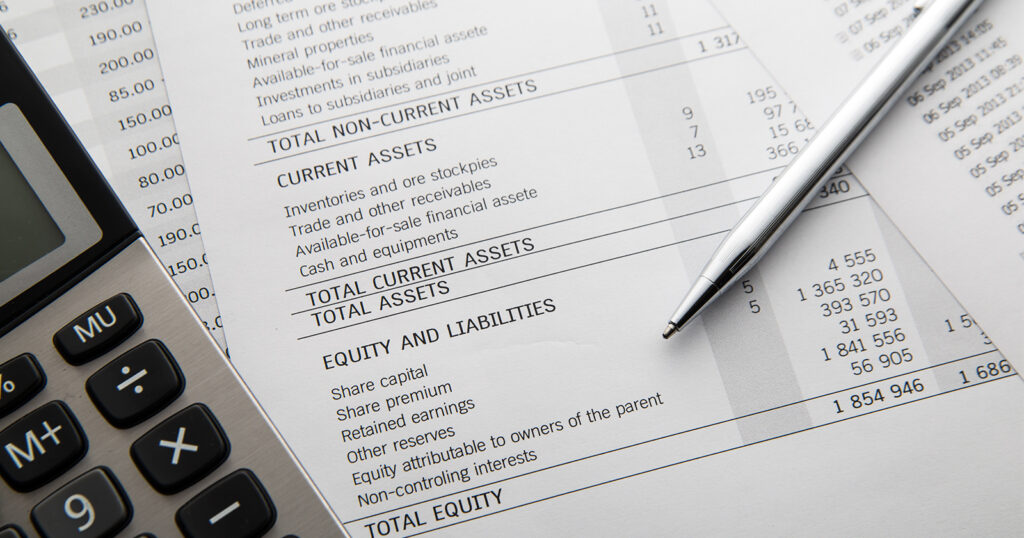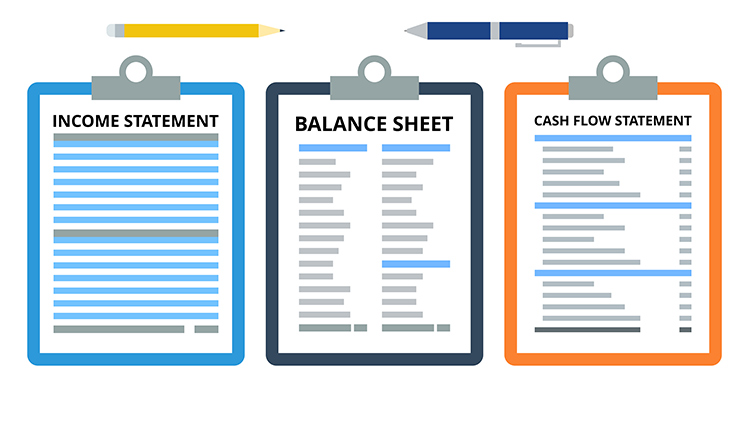There are quite a few financial reports that can be run by an accountant or bookkeeper but all of them aren’t as important as others. We’re going to look at the most important financial reports for small businesses.
Once you have an understanding of these 5 reports, you’ll position your business better to run profitably, prepare for future growth and understand your cash position.

5 Financial Reports Small Businesses Should Generate
There are 5 important financial reports your small business should generate regularly. The first one to understand is the income statement.
#1 – The Income Statement:
This financial report shows a company’s revenues, expenses, and profit or loss over a specific period of time. Small business owners need to be able to track their financial performance and identify areas for improvement.
When you read an income statement, you should be looking at top-line revenue and then the largest expenses that are being deducted from revenue. Is there any way to cut back some of your expenses and make the company more profitable?
Ask your bookkeeper to run an income statement every 6 months so you can go over this report and look at your highest expenses and revenue numbers.
#2 – The Balance Sheet:
Think of the balance sheet as a report that provides a snapshot of a company’s financial position at a specific point in time, showing its assets, liabilities, and equity.
It can show you how much cash is on hand in the business, how much debt is outstanding or how much inventory a company is holding. Just looking at the balance sheet and assessing these high-level numbers is a start.
From there, you can give into a bunch of balance sheet ratios and analytics that can tell a lot more about a business like the current ratio.
Read More:
Closing Entries Accounting Examples (Beginners: Step by Step)
#3 – The Cash Flow Statement:

One of the trickier but still very important financial reports is the statement of cash flows. This report shows the inflow and outflow of cash for a company over a specific period of time.
As a small business owner, if you want to monitor cash flows and ensure sufficient funds to meet your obligations then you’ll need to learn to read a cash flow statement.
#4 – The Statement of Retained Earnings:
Do you want to know how much the business has made over time? Most owners do. The statement of retained earnings shows exactly that. It shows the changes in a company’s retained earnings over a specific period of time.
This financial report is important for small business owners to track the accumulation of profits or losses.
#5 – A Budget:
One financial report that often falls on small business owners themselves is a budget. It is critical to learn how to budget and forecast for the year up ahead. Once you learn to set a good budget, you’ll be able to compare it to the income statement and look at the budget to actual.
This will help you fine-tune and rework your company’s budget. Having an accurate budget can be the difference between keeping your business thriving or missing largely and incurring unexpected costs.
Read More:
How to Study Accounting at Home: Where to Start to Succeed
Preparing Financial Reports: Should You Use an Accountant?

Generally, you can look to an accountant or bookkeeper to prepare the first four financial reports. Since a budget is usually an internal spreadsheet, it’s not common for them to get caught up with that.
As a business owner, you may be considering whether to handle the preparation of financial reports yourself or hire an accountant to do it for you. There are pros and cons to both options, and the decision ultimately depends on your individual circumstances and needs.
If you decide to handle the preparation of financial reports yourself, you will have full control over the process and be able to tailor the reports to your specific needs.
This can be a cost-effective option, especially if you have the knowledge and skills to prepare the reports accurately and efficiently. However, preparing financial reports can be time-consuming and complex. There is also a risk of error or omission if you are not experienced.
When you hire an accountant to prepare your financial reports, you can benefit from their expertise and experience. An accountant can provide valuable insights and advice on how to improve your financial performance and position. You can pick their brain of sorts.
They also help make sure your financial reports are compliant with the standards of your choice i.e. cash or accrual basis. However, hiring an accountant can be more expensive than doing the work yourself but if you do it wrong yourself, it is even more costly.
The Most Important Financial Reports for Small Businesses: Final Thoughts
Financial reports are some of the most important tools small business owners have at their disposal to track their financial performance. The issue is you can’t get good financial reporting unless you understand accounting yourself or outsource it.
Even if you decide to outsource your accounting and financial reporting, work to get an understanding of the above most important financial reports for small businesses and you’ll be able to take action once the reports hit your desk.



